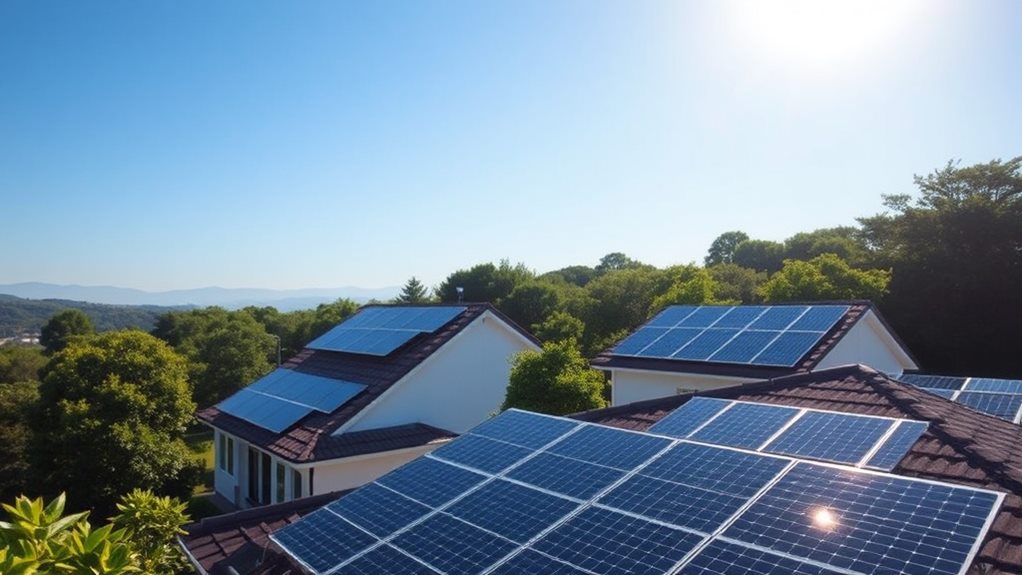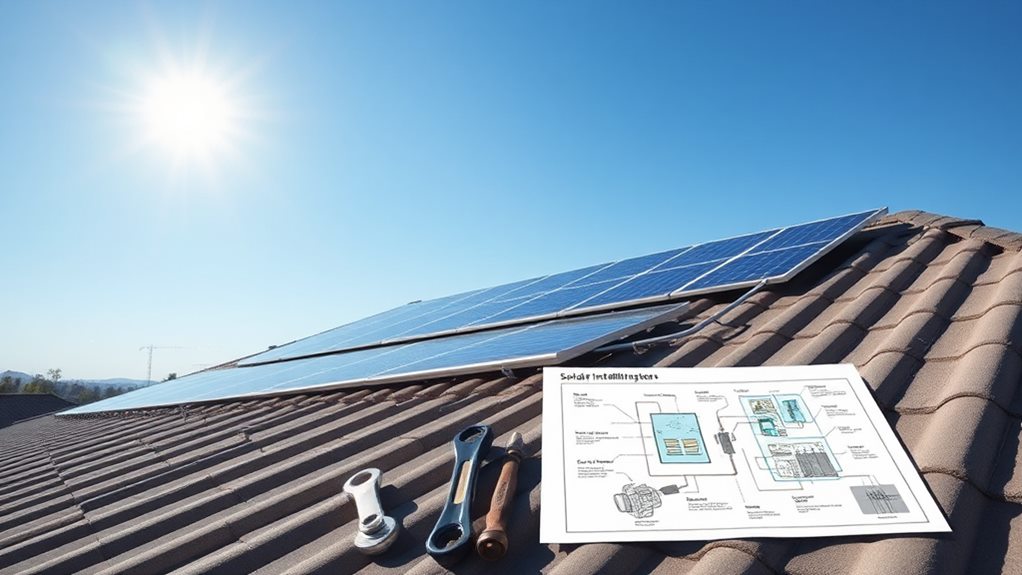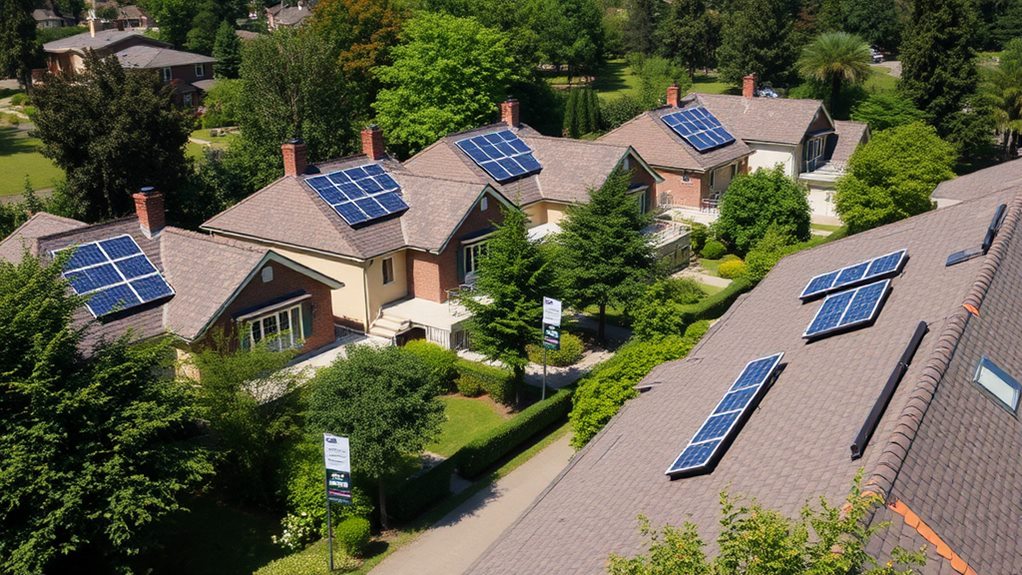To find nearby renewable energy panel installers, start by using platforms like EnergySage, which connect you with rated professionals in your area. Check local reviews on sites like Google and Yelp to evaluate their reputations. It's crucial to gather multiple quotes to compare pricing and services, ensuring you receive the best value. Look for installers with a strong track record, experience since at least 2010, and positive customer feedback. Consider local incentives and financing options that can reduce your costs considerably. For deeper insights into optimizing your solar installation, further exploration will reveal beneficial strategies.
Benefits of Solar Energy

Switching to solar energy can considerably cut down your monthly electricity costs. In Houston, homeowners save an average of $1,727 annually by installing solar panels. This significant reduction in energy expenses not only enhances your financial stability but also contributes to energy independence.
The clean energy generated by solar panels minimizes your environmental impact, supporting a sustainable future. Additionally, many homeowners benefit from solar energy tax credits that further lower their installation costs, making the shift to renewable energy even more appealing.
Moreover, solar panel installation can increase your home resale value, providing long-term financial benefits. Prospective buyers often look favorably upon properties equipped with renewable energy solutions, which can make your home more attractive in a competitive market.
Additionally, the current solar panels cost is offset by various solar incentives, including a federal tax credit that allows you to deduct 30% of your installation costs from your taxes.
Given Houston's impressive 2,633 annual sunshine hours, the potential for solar energy generation is remarkably high. Embracing solar energy not only leads to immediate cost savings but also promotes a healthier planet.
How to Find Local Installers
When you're ready to install solar panels, finding reliable local installers is vital for a successful project. Start by using platforms like EnergySage, where you can enter your zip code to connect with highly-rated solar installers in Houston. This allows you to explore options tailored to your area.
Additionally, consider checking for average installation costs to better understand your budget.
To guarantee you get competitive pricing, compare quotes from multiple installers. Local solar companies often provide quotes that are about 10% lower than national firms.
Additionally, utilize customer reviews from sources like Google, Yelp, and EnergySage to gauge installers' reputations based on verified feedback.
Don't overlook the power of community recommendations. Many local installers are well-regarded within your neighborhood, and dedicated solar marketplaces often feature lists of qualified solar companies in Houston alongside their customer ratings.
Before making a decision, be sure to ask potential installers about their licensing and insurance to verify their credibility. This step is essential in confirming compliance with local regulations and safeguarding your investment throughout the installation process.
Evaluating Installer Reputation

When you're evaluating the reputation of solar panel installers, it's crucial to take into account their ratings and customer feedback. High ratings on platforms like EnergySage, Google, and Yelp can indicate trustworthiness and quality service.
Additionally, taking note of the company's experience and expertise will help guarantee that you choose a reliable installer for your renewable energy needs.
It's also beneficial to gather personal recommendations from friends or neighbors who've gone through the installation process, as firsthand experiences can provide invaluable insights into the installer's performance and customer service.
Installer Ratings and Trust
Evaluating an installer's reputation is essential for anyone considering solar energy solutions. High-quality installer ratings and customer reviews are critical indicators of reliability among solar companies. In Houston, the marketplace boasts an impressive average rating of 5.0 from over 4,126 feedbacks, demonstrating high satisfaction among users.
By switching to solar power, homeowners can benefit from financial savings that lower their utility bills, making a reputable installer even more significant.
When evaluating an installer's reputation, prioritize verified reviews from platforms like EnergySage, Google, and Yelp. These reviews provide a more accurate reflection of installer performance, focusing on five-star ratings and responsiveness.
By examining customer feedback on installation experiences, you can uncover both the positive and negative aspects of each company, allowing you to make informed decisions.
Additionally, it's crucial to understand that installers undergo rigorous screening for quality, ensuring that those listed meet high standards for performance and customer service. This thorough vetting process helps you trust that you're selecting a reputable installer.
Ultimately, taking the time to evaluate installer ratings and customer reviews will empower you to choose a provider that aligns with your solar energy goals, ensuring a successful shift to renewable energy solutions.
Company Experience and Expertise
Choosing a reputable installer means looking closely at their experience and expertise. A solar panel installation company's track record can greatly influence your decision. Here are three key factors to evaluate:
- Company Experience: Look for installers established since at least 2010, like IntegrateSun, LLC or NRG Clean Power, which has been in business since 1987. Their longevity often indicates reliability and industry knowledge.
- Customer Feedback: Research the installation process through verified reviews. Top-rated companies in Houston boast an average customer rating of 5.0 from over 4,126 reviews across platforms like EnergySage and Google. This feedback can reveal insights into the quality of service, including responsiveness and the use of subcontractors.
- Quality Equipment and Warranties: Assess the quality of the equipment offered and the warranties available. High-quality materials and robust warranties are essential for ensuring the longevity and efficiency of your solar system.
Comparing Quotes and Services
Traversing the landscape of solar panel installation can feel overwhelming, but comparing quotes and services can make the process much simpler and more cost-effective. For homeowners in Houston, it's crucial to gather multiple quotes from local installers, as they often offer prices about 10% lower than national companies.
The average installation cost for a solar system in Houston is approximately $27,317 before incentives. By utilizing platforms like EnergySage Marketplace, you can access transparent pricing and over 4,126 customer reviews that help evaluate installer reputations.
When comparing quotes, it's recommended to obtain at least 4-5 offers. This strategy allows you to make informed decisions based on cost, service level, and equipment quality.
Additionally, don't forget to factor in the federal tax credit, which can decrease installation costs by 30%. After incentives, the average total cost for a typical solar system can drop to about $19,122.
Understanding Installation Processes

Understanding the installation process for solar panels is vital for homeowners looking to make the switch to renewable energy. The journey from considering home solar to having a fully operational system involves several key steps. Here's what you can expect:
- Comparing Quotes: Start by gathering estimates from various installation companies. This helps you understand pricing and services offered.
- Required Permits: Once you select a company, they'll handle obtaining all required permits and guarantee compliance with local regulations. This step is significant to avoid any legal issues.
- Final Inspection: After the installation process, local government will conduct a final inspection to approve the system. This verifies everything meets safety and performance standards.
The entire solar panel installation typically takes between 1 to 3 days and includes setup and wiring.
It's also important to inquire whether your installer uses subcontractors, as this can impact the quality of the installation process.
Financing Your Solar Project
When considering your solar project, it's important to understand the various financing options available to you.
From cash payments that grant full ownership to solar loans that offer flexible repayment terms, each choice comes with its own set of benefits.
Additionally, Power Purchase Agreements (PPAs) provide an alternative way to harness solar energy by paying only for the electricity produced.
This makes it vital to evaluate which option aligns best with your financial goals.
Financing Options Overview
Exploring financing options for solar projects can feel overwhelming, but knowing the choices available can simplify the process. Here are three common financing options you might consider:
- Solar Loans: These allow you to spread payments over time, typically with interest rates between 4% and 8%. This option can make solar more financially manageable.
- Solar Leases and Power Purchase Agreements (PPAs): With solar leases, you'll pay a flat monthly fee for using the panels, while PPAs involve paying for the power generated. However, be cautious as these may exclude certain tax incentives and rebates, affecting long-term costs.
- Home Equity Lines of Credit (HELOCs): Leveraging your home's equity can provide a low-interest way to fund your solar installation, potentially lowering your upfront expenses.
Additionally, don't forget about the Federal Solar Investment Tax Credit (ITC), which offers a 30% rebate on project costs for systems installed before January 1, 2032.
This can greatly offset your initial investment. By evaluating these financing options, you can choose the best fit for your financial situation and solar goals.
Solar Loans Explained
Solar loans provide a practical solution for homeowners looking to finance their solar panel installations without the burden of high upfront costs. These loans typically feature fixed interest rates and terms ranging from 5 to 20 years, making budgeting easier. Interest rates for solar loans usually fall between 3% and 8%, depending on your creditworthiness and the lender's terms.
One of the most compelling aspects of solar loans is the potential for significant energy savings. In Houston, homeowners can save an average of $1,727 annually on electricity bills, allowing you to recoup loan payments over time.
Additionally, many solar loans are structured to take advantage of the Federal Solar Investment Tax Credit (ITC), which offers a 30% tax credit for systems installed before 2032, effectively reducing your overall project cost.
Some lenders even provide specialized financing options that require no upfront payment, enabling you to start saving on energy costs immediately.
Power Purchase Agreements
Offering a flexible financing option, Power Purchase Agreements (PPAs) enable homeowners to install solar panels with little to no upfront costs. Under a PPA, you agree to purchase the electricity generated by the panels at a predetermined rate, typically over 20 years. This arrangement can help lower your electricity costs, as the rate is often less than local utility prices.
Here are three key benefits of PPAs:
- Immediate Savings: You can enjoy lower monthly bills right away, enhancing your financial benefits.
- Maintenance-Free: The solar provider manages installation, maintenance, and monitoring, relieving you of these responsibilities.
- Flexibility: At the end of the agreement, you can choose to purchase the system, extend the contract, or have the panels removed, adapting to your future energy needs.
While PPAs don't allow you to directly claim federal tax credits, they provide an attractive way to embrace renewable energy without an initial investment.
This financing option guarantees you can effectively install solar panels while benefiting from reduced electricity costs and the peace of mind of professional maintenance.
Local Incentives and Rebates

In Houston, homeowners can tap into a range of local incentives and rebates that make changing to renewable energy more affordable. One major benefit is net metering, allowing you to earn credits for the excess energy your solar panels generate. This can greatly reduce your electricity bills.
Additionally, Texas offers a Renewable Energy Property Tax Exemption, ensuring that you won't face increased property taxes due to the added value of solar installations.
You may also find local rebates and incentives for energy-efficient upgrades through programs like the Residential Energy Efficiency Rebate Program. These financial benefits can make a considerable difference in your overall investment.
Moreover, the federal tax credit for solar installations currently stands at 30%, which reduces your installation costs dramatically.
To make solar energy more accessible, Texas provides various financing options, including Energy-efficient mortgages (EEMs). These financing solutions can help ease the upfront costs related to solar systems.
Final Thoughts
In summary, finding nearby renewable energy panel installers can transform your energy consumption and save you a fortune. By leveraging local resources, comparing quotes, and understanding the installation process, you'll access a world of benefits that seem almost too good to be true. Don't miss out on local incentives and rebates that could make your solar project more affordable than you ever imagined. Explore today, and watch as your energy bills plummet and your environmental impact shrinks!


Recent Comments